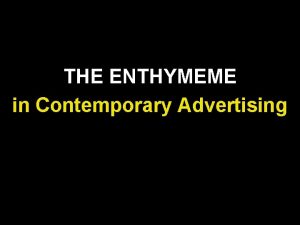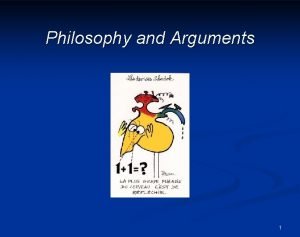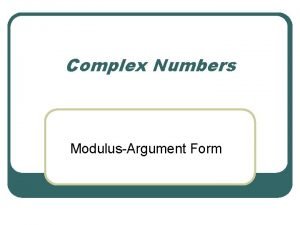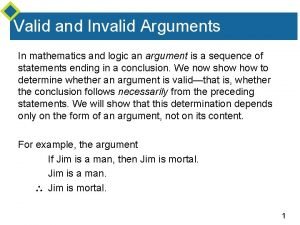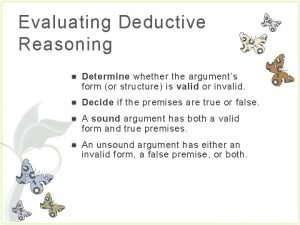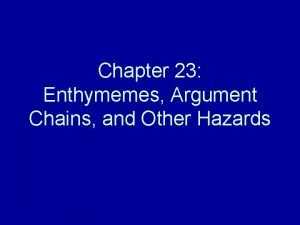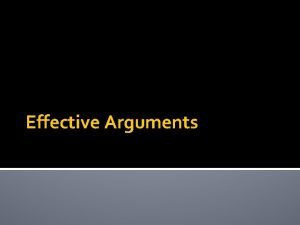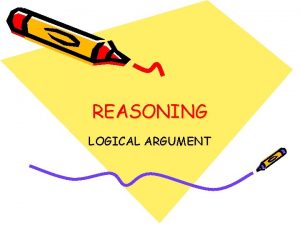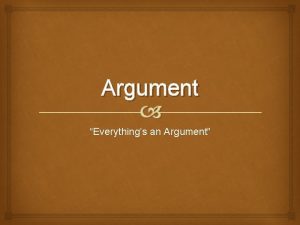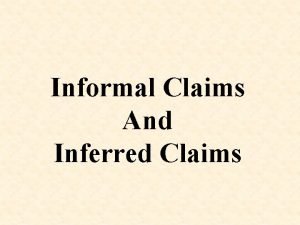Claims and Enthymemes Rudiments of Argument Claims n













- Slides: 13

Claims and Enthymemes: Rudiments of Argument

Claims n n A “claim” is the position you take on your topic and usually constitutes your thesis. A claim is always opposable/arguable and can be supported by evidence. Examples: • Telemarketing provides jobs. • Telemarketers target the old and the gullible.

Common mistakes in claims n A neutral statement that doesn’t take a position. q q There are unstated standards of beauty in the workplace. The way we look affects the way we are treated at work…and the size of our paychecks.

Common mistakes in claims n An announcement of the paper’s topic. q q This paper is about violence on television. TV violence has to take its share of blame for the violence in our society.

Common mistakes in claims n A statement of fact. q q Plessy v. Ferguson, a Supreme Court Case that supported racial segregation, was overturned in 1954 by Brown v. Board of Education. The overturning of Plessy v. Ferguson by Brown v. Board of Education has not led to significant advances in integrated education.

Common mistakes in claims n Personal Conviction q q Racism is the worst kind of prejudice. The best weapons against racism are primary and secondary education.

Common mistakes in claims n Opinion based only on feeling. q q I think water-skiing is a dumb sport. Water skiing should be banned from public beaches.

Common mistakes in claims n Sweeping generalization q q Women understand housework. The publication of a lengthy guide to housekeeping and its success among both men and women suggest a renewed interest in the domestic arts.

Common mistakes in claims. n Avoid sweeping, judgmental, or morally relative terms, such as: q Bad, good, right, wrong, evil, stupid, ridiculous, moral, immoral, dumb, smart, etc.

Enthymeme n n A claim plus a reason. A strong thesis generally consists of a clearly stated claim plus at least one reason. The form is highly adaptable to a five-point essay. q Easiest construction: Add “because” to your claim, or add the word “since” before it.

Enthymeme n A “Warrant” is an assumption inherent to a claim and its reason. Understanding what assumptions others make in their arguments will help you see the ones you make in your own. q Water-skiing should be banned from public beaches because it attracts drunk high school kids. (assumes drunk high school kids are unwanted on beaches)

Syllogism n n n Major Premise (W): All men are mortal. Minor Premise (R): Socrates is a man. Conclusion (C): Therefore, Socrates is mortal.

Practice n Write one claim…it can be about anything. n Add a reason to your claim.
 Enthymemes in advertising
Enthymemes in advertising Teleological argument vs ontological argument
Teleological argument vs ontological argument Unlike routine claims, persuasive claims:
Unlike routine claims, persuasive claims: Argumentsvalid
Argumentsvalid Modulus-argument form complex numbers
Modulus-argument form complex numbers Our personal filters assumptions
Our personal filters assumptions Invalid and unsound argument examples
Invalid and unsound argument examples Invalid argument forms
Invalid argument forms Sound and unsound argument
Sound and unsound argument Unsound and sound argument
Unsound and sound argument Concession rebuttal
Concession rebuttal Teleological argument strengths and weaknesses
Teleological argument strengths and weaknesses Pauline and bruno have a big argument
Pauline and bruno have a big argument Alan and susie an argument
Alan and susie an argument
